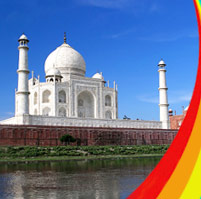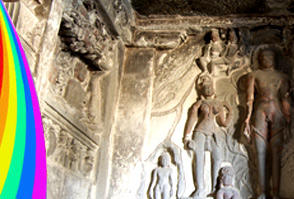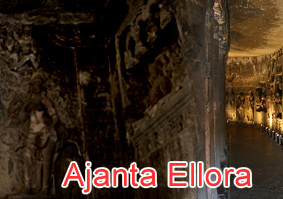The rock-cut Ajanta Caves are renowned masterpieces
for their unique architecture and the profusion of sculptures and
paintings. The walls and ceilings of the Ajanta Caves are chiseled with
exquisite carvings and paintings that chronicle the life of Lord Buddha.
Among the 29 caves, five belong to the Hinayana sect (9, 10, 12, 13 and
15A) while the rest are Mahayana caves.
Cave 1
Located at the eastern end of the horse shoe-shaped ravine, this is the
first cave the visitors come across and thus numbered 1. Essentially a
vihara, it is the most beautifully adorned cave in the complex. The
sanctum of the cave enshrines an imposing image of the Buddha in the
dharamachakra pravartana mudra or the preaching pose. The image was
created with such sculptural virtuosity that Lord Buddha seems to be in
different moods when seen from different angles.
The cave also contains some of the most fabulous Ajanta cave paintings
drawing inspiration from Jataka stories and life of the Gautam Buddha.
The famous painting of Bodhisattva Padmapani shows Buddha wearing a
splendid crown and holding an open lotus in his right hand.
Cave 2
The Cave 2 is notable for its beautifully embellished ceiling depicting
a profusion of decorative motifs. Most of the scenes are from Jataka
tales which narrate Buddha's life in former incarnations such as
Bodhisattva. One of the walls is adorned with the magnificent 'Thousand
Buddhas' painting which portrays how Lord Buddha multiplied himself to
confound a heretic.
Cave 16
Apart from being one of the biggest viharas or monasteries, the Cave 16
is also well-known for elegant decorative murals. The
piece-de-resistance here is the famous painting of 'Dying Princess' on
the left wall. It portrays the distressing plight of Sundari, wife of
Buddha's half brother Nanda who left his wife to become a monk.
Ajanta caves are well-known for their architecture. Learn about the architecture of Ajanta caves in India.
Colors of India: Ajanta Ellora : Ajanta
Caves Architecture









